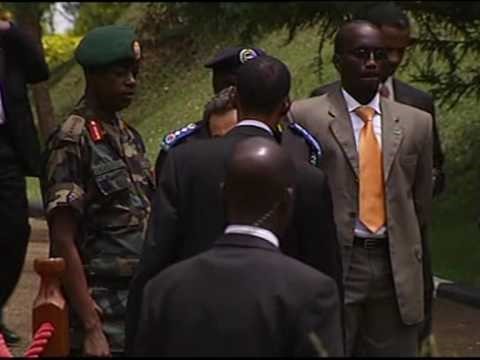 In May 2014, the nation of Rwanda commemorates the twentieth year of its brutal massacre.
In May 2014, the nation of Rwanda commemorates the twentieth year of its brutal massacre.
In one of the most cruel and inhumane moments of history to date, the Hutus massacred 800,000 to 1 million Tutsis as well as moderate Hutus within a hundred days. President Clinton publicly apologised to the Rwandan government on a visit to the Rwandan capital, Kigali, in 1998, for not acting quickly enough and for not immediately identifying the crime of genocide. Furthermore, in what was widely seen as an attempt to diminish his responsibility, he said: "It may seem strange to you here, especially the many of you who lost members of your family, but all over the world there were people like me sitting in offices, day after day after day, who did not fully appreciate the depth and speed with which you were being engulfed by this unimaginable terror."
Today, yet another brutal episode in Syria is underway, where barrel bombs are being dropped on innocent civilians, and where haunting images of brutality, death and suffering are constantly circulating through social media. It is known that one Syrian dies every ten minutes, refugees are fleeing the country at an astonishing rate, and like in Rwanda, many of the most eminent world leaders are once more watching with little or no intervention.
No matter how often the interconnectedness of a globalised world is articulated, the question remains: is the anguish of another nation really felt? It is important to note that the sovereignty of individual nations is not and should not be used as a shield of protection, especially when the global community attempts to alleviate crimes of this nature and magnitude.
The Rwandan government has chosen the path of reconciliation to forgive the perpetrators and move forward. Yet, the situation proves difficult. For instance, the 1000 women who were raped by HIV-infected people still live with the pain and agony of that traumatic experience and are unable to move on. Hence, the steps Rwanda has taken towards supporting and strengthening the reconciliation process stands as a commendable example to the rest of the international community.
Sri Lanka faces a different situation. Thirty years of brutal terrorism wreaked havoc on the country and destroyed the lives of countless innocent Sri Lankans. Today, there is a need to strengthen the reconciliation process and build mechanisms to heal the wounds of ethnic conflict in such a way that it will never return.
While development is an important element, building a wholesome relationship with the Sri Lankan diaspora community is also essential. The tremendous work done by the Tamil and Sinhalese diaspora members should be recognised and spoken proudly of. It is important to consider a Ministry for Reconciliation and Diaspora Affairs with a mandate to work together with the international community. Currently, Sri Lankan migrants are handled by the Ministry of Foreign Employment. This ministry has so many migrant issues to attend to due to the many unskilled migrant workers seeking economic benefits overseas that it scarcely has time to prepare or plan diaspora re-engagement strategies. The proposed ministry could work on the processes of reconciliation and implement the LLRC recommendations on reconciliation. It could also bring in external partners such as Interpeace who have vast experience in countries such as the Democratic Republic of Congo, El Salvador, Guatemala, Honduras, Israel, Liberia, Libya, Palestine, Rwanda, Somali Region and Timor-Leste. They could get involved with mutually agreed terms of reference (TOR) from both parties and work towards national reconciliation with the aid of expert advice.
Many stories of national disharmony in Sri Lankan society, especially after the war, are often heard. Some organisations create religious disharmony and this should be immediately addressed by the government, without which there would be complete and utter chaos. A religious harmony act that prohibits one religious group from disrespecting another could be formulated based on an existing model from a country like Singapore. Under this act, a religious group promoting hate speech against another could be arrested.
Rwanda, with its bitter past, is building a better future with many positive economic indicators. During this author’s visit to South Africa in 2013 for the World Economic Forum on Africa, it was learnt that it is now possible to study for a Carnegie Mellon degree from Rwanda. Under the leadership and vision of President Paul Kegame, Rwanda has established many cogent symbols to remember the past and educate its society. One such place is the Kigali Genocide Memorial Centre established in 2004, a decade after the brutal massacre, and which more than 100, 000 visitors visit every year. In the words of President Kegame, "We cannot turn the clock back nor can we undo the harm caused, but we have the power to determine the future and to ensure that what happened never happens again." It is important to determine the future of many post-conflict nations and nations that are already going through conflict, whilst reflecting on and remembering the horrors that took place in Rwanda two decades ago.
By Special Arrangement with Institute of Peace and Conflict Studies (http://www.ipcs.org)